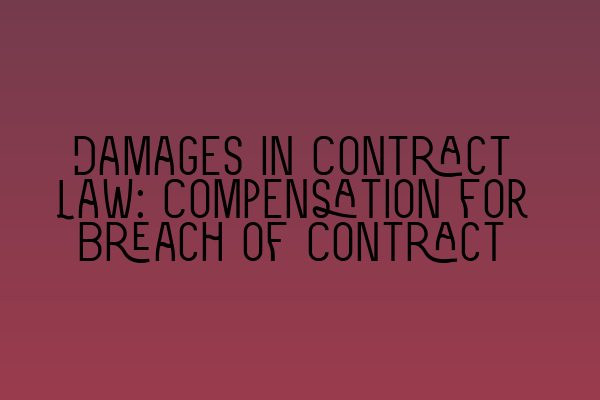Damages in Contract Law: Compensation for Breach of Contract
Contracts are the backbone of business transactions and personal agreements. When parties enter into a contract, they are bound by its terms and obligations. However, not everyone fulfills their contractual promises, leading to a breach of contract. In such cases, the innocent party may seek remedies, including damages, to compensate for the losses suffered as a result of the breach.
What are Damages in Contract Law?
Damages are a common form of remedy in contract law. They provide monetary compensation to the injured party in order to put them in the position they would have been in had the contract been performed as agreed. The purpose of damages is to restore the innocent party to the position they would have been in had the contract not been breached and to provide compensation for any losses incurred.
There are several types of damages that may be awarded in contract law:
- Compensatory Damages: Compensatory damages aim to compensate the injured party for the actual loss suffered as a result of the breach. These damages are typically awarded to cover any financial harm, such as lost profits, costs incurred, or diminished value of goods or services.
- Consequential Damages: Consequential damages are awarded when the injured party suffers additional losses beyond the direct damages caused by the breach. These damages are often caused by indirect and foreseeable consequences of the breach. For example, if a construction contractor fails to complete a project on time, the client may suffer financial losses due to delays in opening the business.
- Incidental Damages: Incidental damages refer to the reasonable costs incurred by the injured party as a result of the breach. These may include expenses related to finding an alternative supplier or repairing defective goods.
- Liquidated Damages: Liquidated damages are agreed upon by the parties in advance, usually through a specific provision in the contract. These damages are a predetermined amount that the breaching party must pay if they fail to perform their obligations under the contract. Liquidated damages need to be a reasonable estimate of the potential losses that may occur due to a breach.
- Punitive Damages: Unlike the other types of damages mentioned above, punitive damages are not designed to compensate the injured party. Instead, they are awarded to punish the breaching party for their willful misconduct or gross negligence. However, punitive damages are generally rare in contract law and are more commonly awarded in cases of torts or intentional wrongdoing.
Proving Damages in Contract Law
When seeking damages for breach of contract, the innocent party needs to establish that they have suffered actual harm as a result of the breach. This requires proving the following:
- The existence of a valid contract: The injured party must demonstrate that a valid contract existed between the parties involved.
- The breach: The injured party needs to show that the other party failed to perform their obligations as agreed in the contract.
- The causation: There must be a clear link between the breach of contract and the losses suffered.
- The quantification of damages: The injured party should provide evidence to support the calculation of the damages sought. This may involve presenting financial records, invoices, expert opinions, or other relevant documentation.
It is important to note that the innocent party has a duty to mitigate their losses. This means they must take reasonable steps to reduce or minimize the damages that arise from the breach. Failure to mitigate may affect the amount of damages awarded or even preclude any recovery.
Conclusion
In contract law, damages are a vital tool for providing compensation to the innocent party when a breach of contract occurs. They help restore the injured party to the position they would have been in had the breach not occurred and compensate them for any losses suffered.
If you are facing a breach of contract situation, it is crucial to seek legal advice to understand your options and protect your rights. Visit SQE Contract Law for more information on navigating legal challenges, understanding the competence statement, choosing a solicitor specialization, and selecting the best law school in the UK.
Sources:
